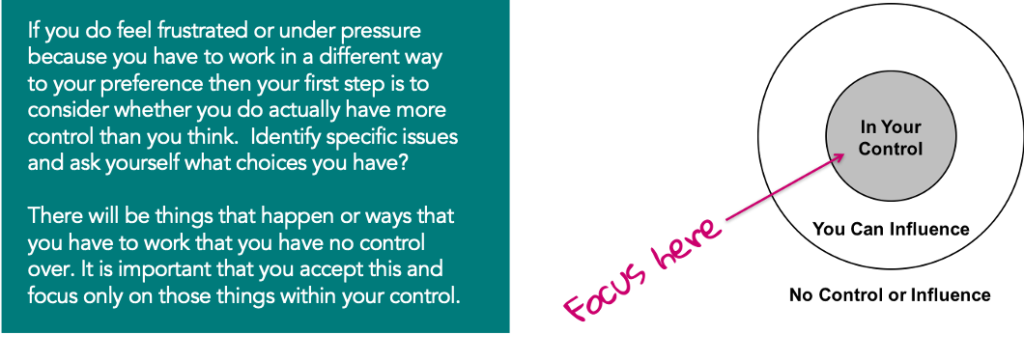You need to be able to identify those things most likely to cause stress in the workplace.
This article is broken down in to 6 sections which identify potential risk factors and areas that could test and reduce your ability to work well. Each one is relevant to your day to day experiences in school. They were created by the Health and Safety Executive in extensive research and are called Management Standards.
Becoming familiar with these will help you to plan and manage everything in a way that builds your wellbeing and resilience rather than reducing it.
The six management standards (the risks you need to manage) are:
- The demands you face (workload, work patterns, working environment and anything that adds to these, including student behaviour).
- Control (how much say and autonomy you have over what you do and how you do your work)
- The support you receive (the encouragement from leaders and colleagues and the resources to which you have access)
- Your relationships at work (the extent to which positive working practices and behaviours are encouraged and problems dealt with quickly and effectively).
- Your role (whether you clearly understand what is expected of you and how well your role fits with that of your function and the aims of the school)
- Change (how it’s managed and communicated to you)
You are likely to experience stress when you perceive a risk that sits in one of the management standards is greater than your ability to cope with it. There are many examples in school that could cause you to feel this way, and particularly during your busiest times. We will explore some of these throughout the rest of this article.
Once you are familiar with the things that may cause you stress, you can then use the actions highlighted in the articles and chat cards that make up our Resilience and Wellbeing Toolkit to help to deal with them. The cards give you quick action tips that you can put in place to help you deal with situations in the moment.
The demands you face
If you are to be productive, happy and successful then you have to be able to cope with the demands of your job. This includes being able to successfully manage your workload, work patterns and the environment.
You are already busy and the demands on you can regularly increase through:

- Other staff absence and sickness
- Planning for parent evenings and other events
- Extra – curricula activities
- Taking on additional work or responsibilities without feeling you have the knowledge or skills
- Responding to parents and being able to meet their needs
- Training and supporting new staff members
- Poor student/pupil behaviour and disruptions
- Attending meetings
- Systems change
It’s also likely that there will be parts of your job or situations you find more challenging or where you are under greater pressure and this is natural. It is important you accept this and focus on actions you can take to better manage the times when this happens.
The CHAT CARDS have suggestions for how you might better deal with the demands you face.
The control you have over your work
If you feel you have some say about the way you are able to carry out your work you are likely to feel more in control, and more resilient in the face of adversity. It isn’t always possible to have control, particularly when there is a need to respond to student / pupil demands and other changes, such as:
- As a leader, teacher or staff member, much of your timetable is set for you.
- The curriculum is usually decided (though you have choices around how you do things).
- Other people, e.g. staff absences or student behaviour (these also add to the demands on you)
- Interruptions and being asked to solve other people’s problems
- External influences, such as Government and inspectors!
- The way you are asked to carry out much of your work.

Continually challenging or trying to change things that sit outside your circle of control will lead to stress and impact on your enjoyment and performance. If you are not sure then speak to your line manager or colleagues, as there may be opportunities to influence what is happening.
If you do ask and it becomes clear that you do not have a choice then accept this and focus back on those areas that are within your control.
You can use the ‘PLANNING’ Chat Card to help you identify what you might do in this area
If you have any questions or would like to find out more about building resilience or improving staff wellbeing, please get in touch.
The support you receive
Do you have the information you need to do your job effectively and to enjoy it! That’s part of the aim of providing you with resources such as this, but there are many other areas where you may need support:
- From your line manager and other members of school leadership
- From colleagues
- In dealing with parents, particularly where issues raised cannot be easily or quickly resolved
- Where to find documents and planning tools
- Issues with other members of your team or student behaviour
- Systems and other school processes
- What is expected from your marking, for example is fear of getting it wrong meaning you are doing too much?

How can you make sure you get the support you need?
- Make sure you know what information and resources are available to support you in your school – if you are not sure of something then don’t wait to be told or be frightened to speak up.
- Give support to your colleagues and line manager when it is needed. People tend to reciprocate and so the more supportive you are to others, the more support you are likely to receive back.
- Learn to recognise when you need support and don’t be afraid to ask for help. Your line manager and colleagues will want to be there for you. Be aware of any relationships that are not healthy and you might need to work on – don’t ignore this. Remember others may not have the same characteristics and preferences as you and their behaviour may simply be representative of this, rather than any deliberate attempt to hinder you.
- Ask for training or development that will help you to do your job better and mean you will feel more able to carry it out.
- Practice self-care and look after yourself. Do take the opportunity to change tasks and relax during any breaks or lunch, even if it is for a short period. Drink water and eat as needed to maintain energy levels. It is much easier to feel supported and to support others when you are taken care of first. You must put your oxygen mask on before helping others!
Start with the ‘PEOPLE’ and ‘PHYSICAL ACTION’ Chat Cards to help address this area.
Your relationships with colleagues
How does your school promote positive working practices to avoid conflict and take steps to deal with unacceptable behaviour. There may be times when your relationships with other colleagues may be strained or you feel their behaviour towards you (or others) is inappropriate, unacceptable or causing you stress. If this is happening then speak with them, your line manager and/or a trusted colleague.
You are likely to know if there is a problem in this area if you identify there is:

- Increases in or a high level of sickness and absences (which also adds to the demands you and others face).
- A high level of turnover and/or inexperience in the school.
- People regularly turn up late to meetings, events or places they should be and/or let colleagues down.
Relationships are all about awareness. How aware are you about your behaviour and the behaviour of others?
- Find out your trigger points. Are there specific people or actions that cause a breakdown in their relationship with you (or others). Identify what these are and either address them with the individual or learn to accept them. It is likely they are just different to you. Where these are significant or affect a larger number of people they do need to be tackled.
- Ask for support, if you are unsure what to do, either from your line manager or a trusted colleague.
- Reflect honestly and recognise when it may be your behaviour that is causing an issue. Don’t be afraid to ask others for perspective and feedback. Ask what you might do differently to change the situation – remember if you want others to change it is likely that you will need to change too.
- Ask for training or development that will help, for example in how to hold coaching conversation.
Start with the ‘PEOPLE’ Chat Card to help address this area.
Understanding your role
How well you understand your role and what is expected of you will help you to reduce any workplace stress and build your resilience. It will also help make sure you perform effectively and you will be more likely to enjoy your work.
Here are some examples that may cause you or others to struggle in this area:
- You are new and still learning.
- You have multiple roles, for example, teaching, form tutor, and head of year / department.
- Following significant changes.
- Conflicting messages or directions from one or more leaders.

So how can you make sure you are clear on what you need to do?
- Speak with your line manager. As preparation you can write out what you believe are the expectations of your role in a simple note for yourself and then ask your line manager for their view.
- Create a detailed personal development plan to address any gaps between your current skills and those you might need to be fully competent in all aspects of your role. The more able you are to tackle what is needed from you, the less likely it is that you will experience workplace stress.
- Look for other information and policies that cover areas of concern and speak with your manager and colleagues to really understand the expectations of different stakeholders.
- Managers can ask team members to talk through their role and their responsibilities. This is a great way to check understanding and also involve individuals in a discussion that will help them to take ownership for delivering what is expected of them.
Don’t be afraid to ask about anything you are unsure about to help you better enjoy and be successful in your role.
Use the ‘PURPOSE’ Chat Card to help you identify what you might do in this area.
How change is managed and communicated
How change is managed and communicated to you will affect how resilient you are likely to be when you meet any challenge or adversity. It is often fear of the unknown, failure, uncertainty or worry about what others think that can make change difficult to cope with in an organisation.
If you aren’t sure what is going on, take steps to actively involve yourself in the change and to help you understand what is coming, so you are more likely to know:

- How it will impact on your current workload.
- The effect it might have on your emotions (if it is being imposed and you have little control).
- If it might mean you need to take on new responsibilities or even change roles.
- Any changes to structures or ways of working that affect you.
However, it may not always be possible to keep you fully informed and while some change may be outside your control, there are some steps you can take to better manager change for yourself and your team:
- Make sure you are involved in decisions that affect you and ask about them. If you lead others then involve them in decisions and communicate early and regularly about any changes that are to be made.
- Delegate effectively and ensure you pass responsibilities to other members of your team.
- Where it is known, set out a schedule for any change and a timetable for communications and stick to it or if the change is coming from others, ask them for their timetable.
- Keep people updated or ask for updates – it is much better to over rather than under communicate. It stops people making their own assumptions.
The ‘POSITIVE MINDSET’ Chat Card is a good place to start.
While individuals must take responsibility for their own wellbeing and managing stress, line managers also have a big part to play. Are they self-aware and do they lead well and take into account the six management standards covered in this article?
If you are a line manager, how well do you:
- Support team members with workload and consider this when talking with them or introducing additional tasks? Do you look to remove as well as add things?
- Involve team members in decisions that affect them and give them choice in what and how they carry out their job?
- Provide support and regularly praise and recognise contributions and as well as holding people to account?
- Deal with instances of conflict, bullying or harassment and create a culture where values are known and lived to?
- Ensure team members understand what you expect of them and create a shared vision so everyone understands their part on the bigger picture?
- Consult team members on change, big and small, paint a picture of how it will look in practice, listen to feedback and make yourself available for questions?
You have to be clear on those behaviours that build a thriving culture and eliminate those that don’t and model them every day and consistently.
If you have any questions or would like to find out more about the major causes of workplace stress, building resilience or improving staff wellbeing, please get in touch.
Other articles in our resilience and wellbeing toolkit
Resilience and wellbeing toolkit (introduction)
The difference between pressure and stress
Building resilience and lowering stress
Managing stress and building resilience
13 tips to build your energy and wellbeing
